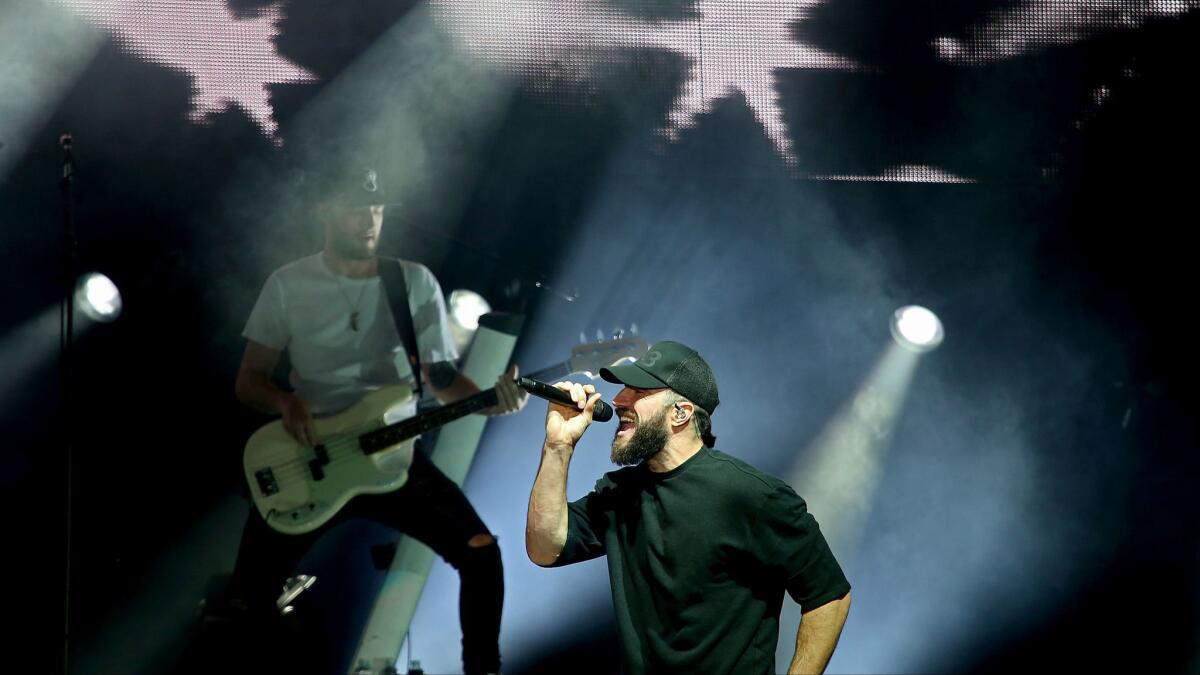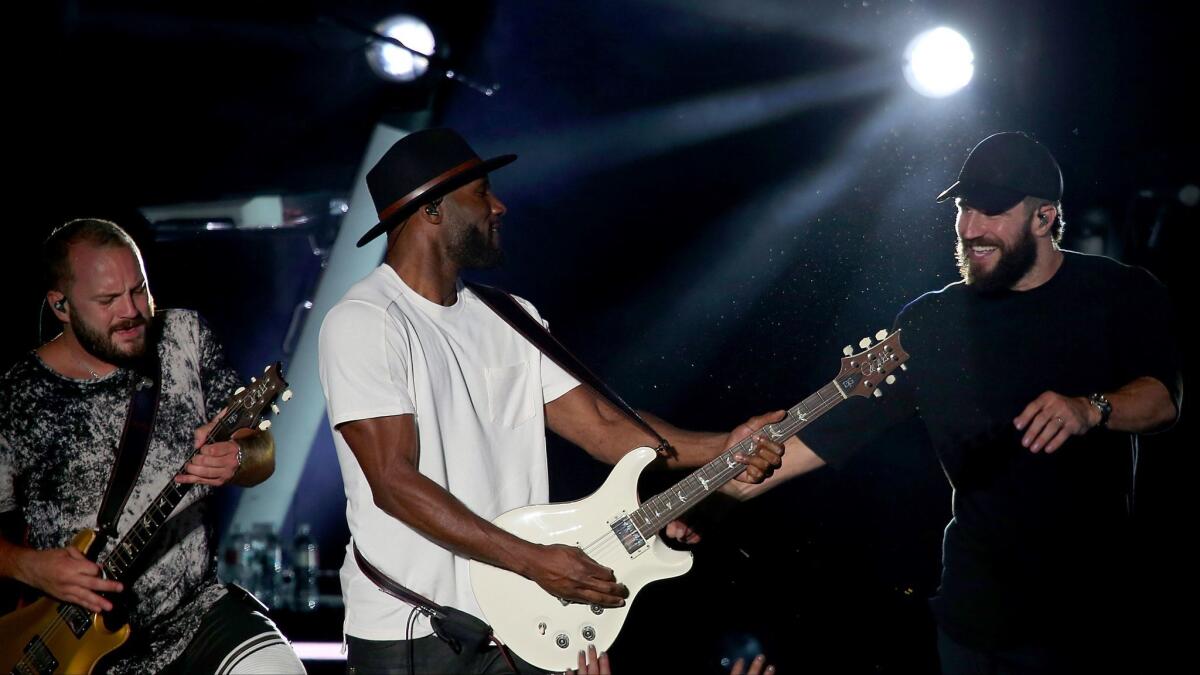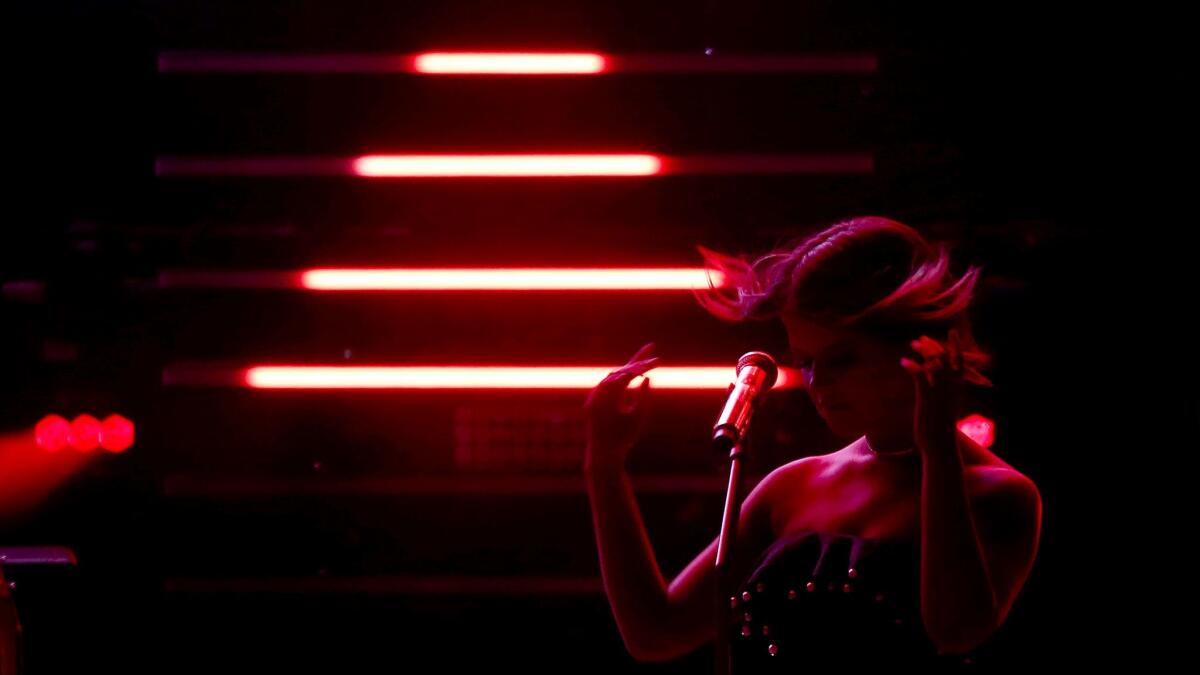Review: What Sam Hunt had to say about cultural integration at the Greek Theatre

Sam Hunt started out in one place Tuesday night but ended up in quite another.
The singer of the year’s biggest country hit, “Body Like a Back Road,” was about halfway through the first of two concerts at the Greek Theatre when he sat down on a stool for a “little chat,” as he put it, about how he developed his distinctive sound.
Growing up in a small town in Georgia, he said, he listened to country music because that was the only kind available to a kid who “couldn’t tell you the difference between Nirvana and Madonna.” As he got older, though, he discovered other stuff, much of it online, which quickly broadened his worldview. And he wasn’t alone.
“No generation has ever been as culturally integrated as this one,” he told the audience, explaining that young people no longer think about music — or human beings — in terms of genre. Then the 32-year-old went further, his voice thickening with emotion: “When y’all take over, you’re gonna tear down the walls that divide us.”
Hunt insisted he wasn’t preaching, but in a way he was — and good for him.
Too few artists in the relatively conservative country scene have spoken out in the days since a white-supremacist rally erupted into violence last weekend in Charlottesville, Va. Yet the horrifying incident seemed clearly to be on Hunt’s mind as he made his remarks Tuesday.
At a moment when many A-listers — not to mention President Trump — appear unwilling to take a firm stand against hate, it was gratifying to see Hunt go there.

By now, of course, this down-home maverick has grown accustomed to disrupting country norms. “Montevallo,” Hunt’s hit 2014 debut, is the edgy if natural product of his Internet-era upbringing, with twangy guitars laid over sleek R&B grooves and a unique vocal approach that sits somewhere between singing and rapping.
In his lyrics, Hunt proudly positions himself in the rural South; he’s always looking for a good time in a town that closes up at sundown. But the music illuminates the hidden complexity of that environment — the intricate weave of white and black tradition — with uncommon elegance.
And it’s obviously resonating with fans: “Body Like a Back Road,” an irresistible ode to a woman whose curves the singer knows like the back of his hand, has been at No. 1 on Billboard’s country chart since February.
At the Greek — where he shared the bill with another country upstart, Maren Morris — Hunt said he couldn’t believe how far he’d come since he visited Los Angeles in early 2015 to play the Troubadour.
Yet there was an ease to his performance here that highlighted the inevitability of his approach (and perhaps his ascent).
Backed by a muscular four-piece band and dressed in baggy all-black like the former football player he is, Hunt moved between party songs beefed up with looped hip-hop rhythms and gentler ballads full of spacey synth sounds.
Before “Ex to See,” the beginning of Kendrick Lamar’s “Humble” blasted out over the capacity crowd, which reacted as enthusiastically as when Hunt covered “It’s a Great Day to Be Alive” by Travis Tritt. And later, during his talk about cultural integration, Hunt strummed a few bars of some of the songs he said had shaped him, including Alan Jackson’s “Don’t Rock the Jukebox” and Usher’s “Nice & Slow.”
In each, he sounded so comfortable that the idea of walls seemed hopelessly old-fashioned.

Morris, whose gospel-accented “My Church” won a Grammy Award this year, didn’t explicitly touch on current events in her opening set — though she did deplore the “seething hatred” on display in Charlottesville in a tweet on Saturday.
But like Hunt’s, the singer’s assured performance was its own testament to the value of open-mindedness, with an appealing blend of shiny pop (“’80s Mercedes”), leathery soul (“Once”) and tender folk (“I Could Use a Love Song”).
To finish her portion of the show, Morris sang “Second Wind,” a gutsy statement of self-affirmation from her excellent 2016 debut, “Hero.” Then, just for good measure, she tacked on a bit of Beyoncé’s churchy “Halo.”
If she was preaching, nobody in the crowd seemed to mind.
Twitter: @mikaelwood
ALSO
Lady Gaga was a better troubadour than a superstar at the Forum
Meet Busbee, the producer who helped Maren Morris get to the Grammys
From sex bomb to philosopher: How Neil Diamond celebrated 50 years in show business
More to Read
The biggest entertainment stories
Get our big stories about Hollywood, film, television, music, arts, culture and more right in your inbox as soon as they publish.
You may occasionally receive promotional content from the Los Angeles Times.











